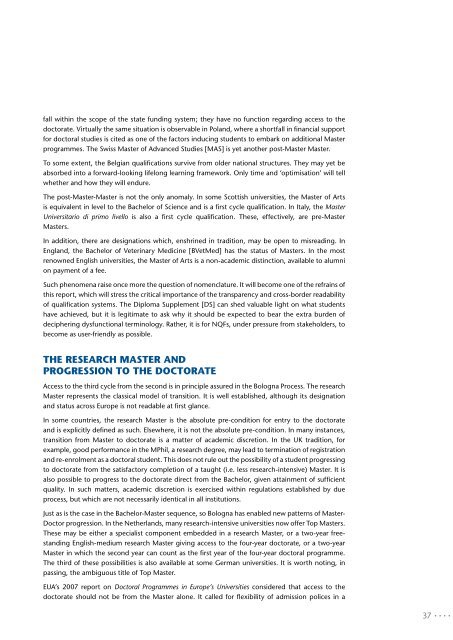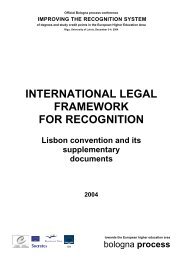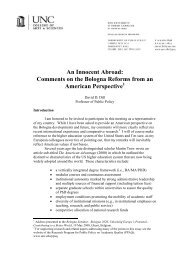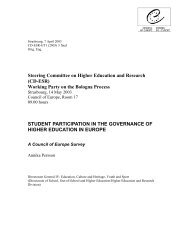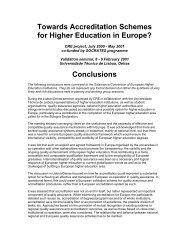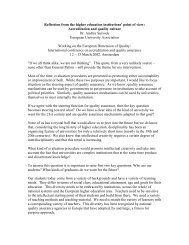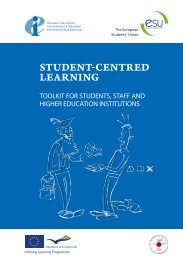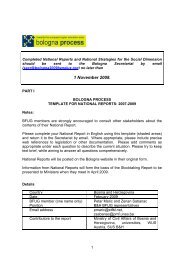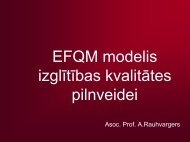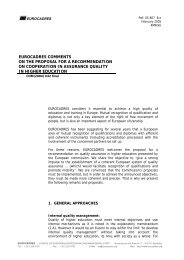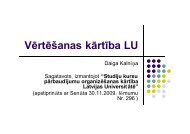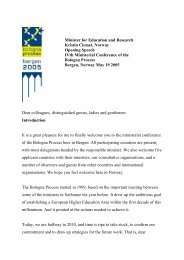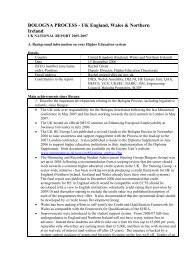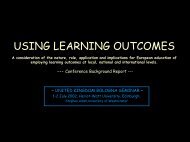EUA Survey Of Master Degrees In Europe - European University ...
EUA Survey Of Master Degrees In Europe - European University ...
EUA Survey Of Master Degrees In Europe - European University ...
You also want an ePaper? Increase the reach of your titles
YUMPU automatically turns print PDFs into web optimized ePapers that Google loves.
fall within the scope of the state funding system; they have no function regarding access to thedoctorate. Virtually the same situation is observable in Poland, where a shortfall in financial supportfor doctoral studies is cited as one of the factors inducing students to embark on additional <strong>Master</strong>programmes. The Swiss <strong>Master</strong> of Advanced Studies [MAS] is yet another post-<strong>Master</strong> <strong>Master</strong>.To some extent, the Belgian qualifications survive from older national structures. They may yet beabsorbed into a forward-looking lifelong learning framework. Only time and ‘optimisation’ will tellwhether and how they will endure.The post-<strong>Master</strong>-<strong>Master</strong> is not the only anomaly. <strong>In</strong> some Scottish universities, the <strong>Master</strong> of Artsis equivalent in level to the Bachelor of Science and is a first cycle qualification. <strong>In</strong> Italy, the <strong>Master</strong>Universitario di primo livello is also a first cycle qualification. These, effectively, are pre-<strong>Master</strong><strong>Master</strong>s.<strong>In</strong> addition, there are designations which, enshrined in tradition, may be open to misreading. <strong>In</strong>England, the Bachelor of Veterinary Medicine [BVetMed] has the status of <strong>Master</strong>s. <strong>In</strong> the mostrenowned English universities, the <strong>Master</strong> of Arts is a non-academic distinction, available to alumnion payment of a fee.Such phenomena raise once more the question of nomenclature. It will become one of the refrains ofthis report, which will stress the critical importance of the transparency and cross-border readabilityof qualification systems. The Diploma Supplement [DS] can shed valuable light on what studentshave achieved, but it is legitimate to ask why it should be expected to bear the extra burden ofdeciphering dysfunctional terminology. Rather, it is for NQFs, under pressure from stakeholders, tobecome as user-friendly as possible.The research <strong>Master</strong> andprogression to the DoctorateAccess to the third cycle from the second is in principle assured in the Bologna Process. The research<strong>Master</strong> represents the classical model of transition. It is well established, although its designationand status across <strong>Europe</strong> is not readable at first glance.<strong>In</strong> some countries, the research <strong>Master</strong> is the absolute pre-condition for entry to the doctorateand is explicitly defined as such. Elsewhere, it is not the absolute pre-condition. <strong>In</strong> many instances,transition from <strong>Master</strong> to doctorate is a matter of academic discretion. <strong>In</strong> the UK tradition, forexample, good performance in the MPhil, a research degree, may lead to termination of registrationand re-enrolment as a doctoral student. This does not rule out the possibility of a student progressingto doctorate from the satisfactory completion of a taught (i.e. less research-intensive) <strong>Master</strong>. It isalso possible to progress to the doctorate direct from the Bachelor, given attainment of sufficientquality. <strong>In</strong> such matters, academic discretion is exercised within regulations established by dueprocess, but which are not necessarily identical in all institutions.Just as is the case in the Bachelor-<strong>Master</strong> sequence, so Bologna has enabled new patterns of <strong>Master</strong>-Doctor progression. <strong>In</strong> the Netherlands, many research-intensive universities now offer Top <strong>Master</strong>s.These may be either a specialist component embedded in a research <strong>Master</strong>, or a two-year freestandingEnglish-medium research <strong>Master</strong> giving access to the four-year doctorate, or a two-year<strong>Master</strong> in which the second year can count as the first year of the four-year doctoral programme.The third of these possibilities is also available at some German universities. It is worth noting, inpassing, the ambiguous title of Top <strong>Master</strong>.<strong>EUA</strong>’s 2007 report on Doctoral Programmes in <strong>Europe</strong>’s Universities considered that access to thedoctorate should not be from the <strong>Master</strong> alone. It called for flexibility of admission polices in a37


